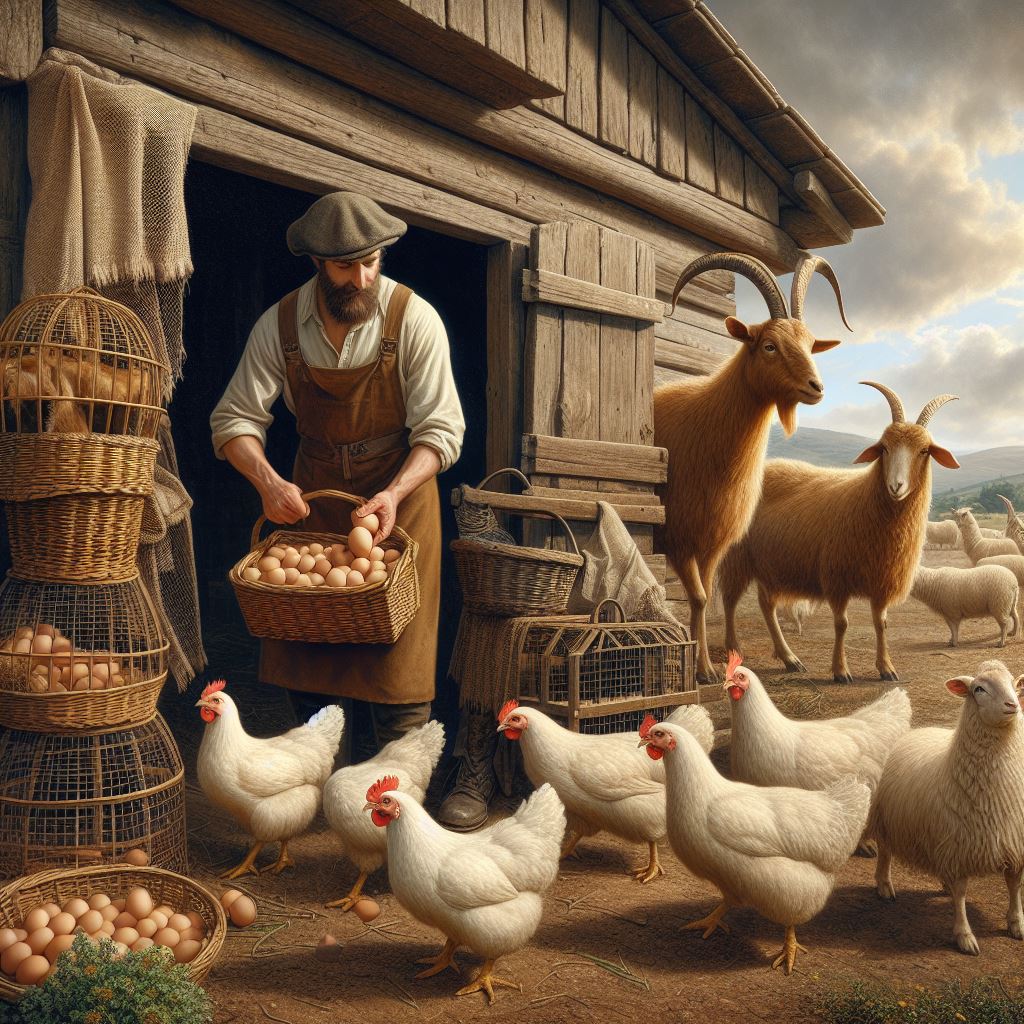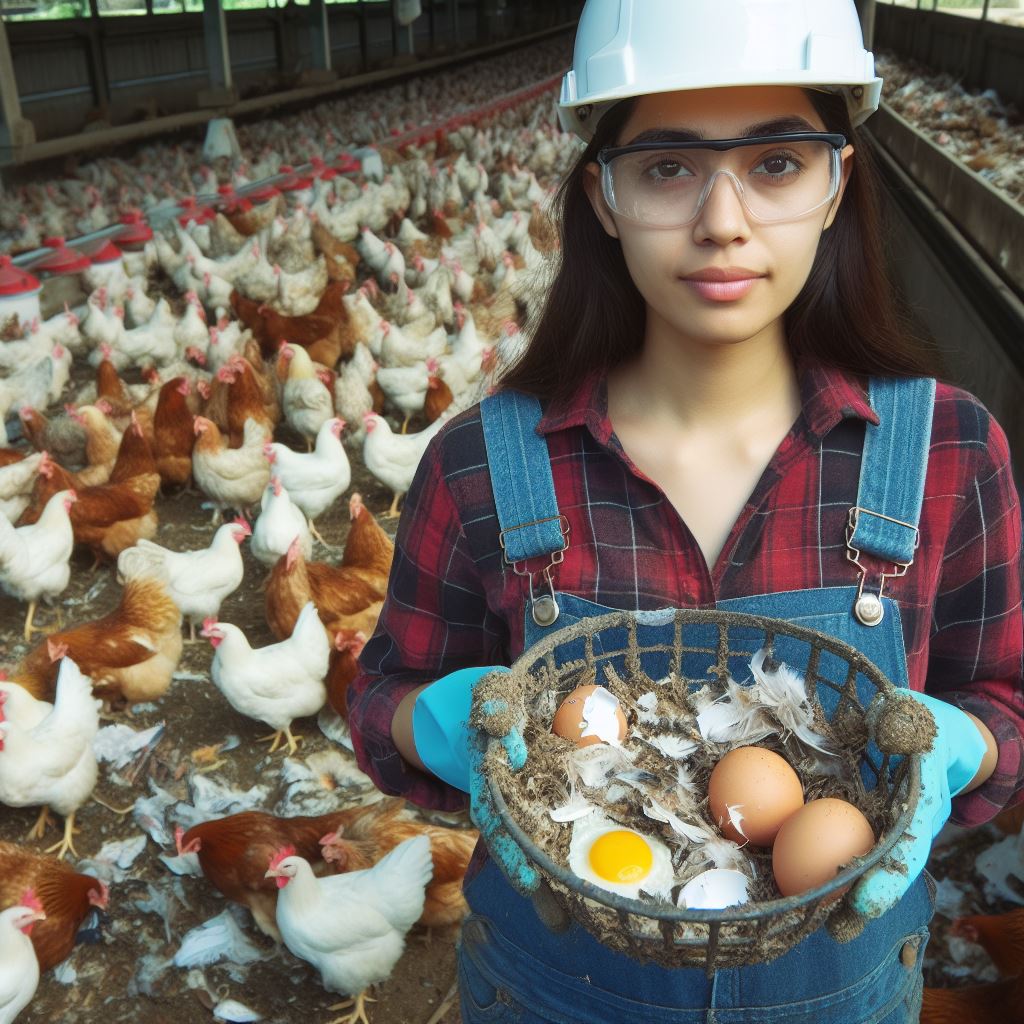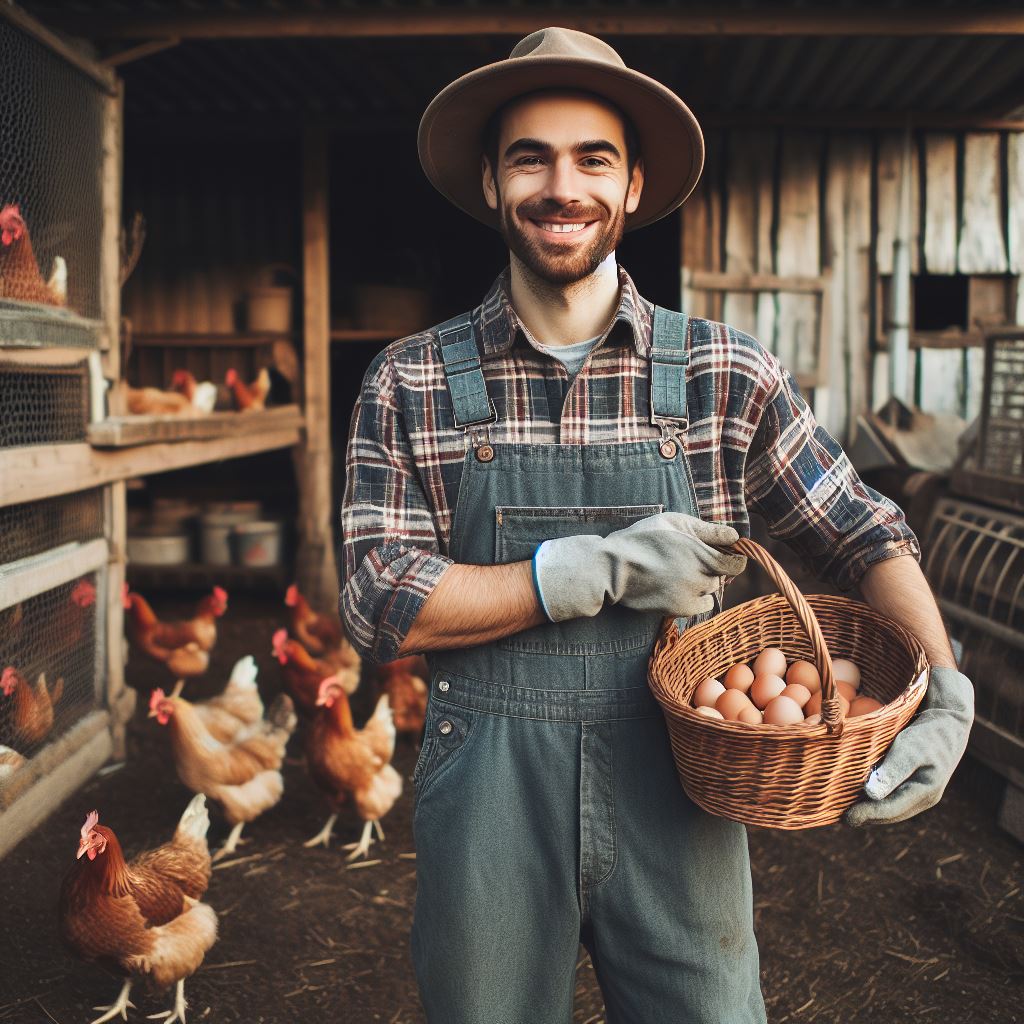Introduction
Definition of organic poultry farming
Organic poultry farming involves raising chickens, turkeys, and other birds using natural and sustainable practices.
It focuses on providing a healthy and stress-free environment for the birds, free from synthetic additives and genetically modified organisms.
Importance of organic poultry farming
The importance of organic poultry farming lies in the production of high-quality, hormone-free, and chemical-free poultry products.
Consumers are becoming more conscious of their food choices, preferring organic options that are free from pesticides and antibiotics.
Purpose of the guide
The purpose of this comprehensive guide is to provide a step-by-step approach for individuals and farmers interested in starting their organic poultry farm.
It aims to offer valuable insights, techniques, and tips to ensure the success of the venture.
By following this guide, readers will learn about organic poultry farming principles, such as providing organic feed, practicing disease prevention and control, and implementing animal welfare standards.
They will also gain knowledge about organic certification processes and marketing strategies to reach the target audience.
Moreover, this guide will discuss the various challenges and potential solutions that arise in organic poultry farming, including pest management, waste management, and meeting nutritional requirements.
In general, organic poultry farming offers numerous benefits, both for the health-conscious consumers and the farmers themselves.
This guide serves as a valuable resource to navigate the complexities of organic poultry farming and achieve success in this rewarding agricultural sector.
Getting Started with Organic Poultry Farming
Benefits of starting an organic poultry farm
- Increased demand for organic poultry products due to growing health-conscious consumer trends.
- Higher profit margins as organic poultry products often command premium prices in the market.
- Opportunity to contribute to sustainable agriculture and promote animal welfare.
- Reduced dependence on chemical inputs as organic farming practices focus on natural alternatives.
- Potential to access niche markets, such as specialty stores and restaurants catering to organic consumers.
- Enhanced brand value and customer loyalty by offering healthier and environmentally-friendly products.
Choosing the right location for your farm
- Availability of adequate land and infrastructure for housing poultry, pasture, and feed storage.
- Proximity to target markets to minimize transportation costs and ensure fresh product delivery.
- Access to clean and reliable water sources for the poultry’s drinking and sanitation needs.
- Absence of potential sources of contamination, such as industrial pollutants or chemical-intensive farms.
- Existence of suitable climatic conditions that support poultry health and productivity.
- Consideration of zoning and land-use regulations to ensure compliance with local laws and restrictions.
Permits and regulations for organic poultry farming
- Obtain the necessary licenses and permits required by local, state, and federal authorities.
- Comply with organic farming regulations, including organic feed sourcing and health management practices.
- Adhere to industry-specific guidelines, such as organic poultry standards set by certifying organizations.
- Regularly monitor and document farm activities to maintain compliance with regulatory requirements.
- Participate in routine inspections conducted by certifying bodies to ensure adherence to organic standards.
- Stay updated with any changes or updates in organic farming regulations to avoid penalties or loss of certification.
Importance of organic certification
- Organic certification establishes credibility and trust among consumers, retailers, and other stakeholders.
- Ensures compliance with organic standards, guaranteeing the integrity of organic poultry products.
- Access to premium markets and higher price premiums compared to non-certified products.
- Participation in government-funded organic programs and eligibility for organic farming grants.
- Facilitates international trade by meeting the requirements for organic product exportation.
- Demonstrates commitment to sustainable practices and environmental stewardship
Read: The Importance of Biosecurity in Poultry Farms
Setting Up Your Organic Poultry Farm
In order to establish a successful organic poultry farm, several key steps need to be followed:
Selecting the Right Poultry Breeds
- Conduct thorough research to determine which poultry breeds are suitable for organic farming.
- Consider factors such as adaptability to local climate, resistance to diseases, and market demand.
- Choose breeds that are known for their good egg production or meat quality, depending on your focus.
- Look for heritage or rare breeds, as they often have better genetic diversity and disease resistance.
Designing and Building the Poultry Housing
- Design a poultry housing layout that allows for proper ventilation, ample space, and easy cleaning.
- Ensure the design takes into account the specific needs and behavior of the selected poultry breeds.
- Use high-quality materials that are durable, non-toxic, and provide insulation against extreme temperatures.
- Incorporate features such as nest boxes, perches, and separate areas for feeding and watering.
Creating a Suitable Outdoor Space for the Poultry
- Allocate sufficient outdoor space to allow the poultry to engage in natural behaviors and forage for food.
- Ensure the outdoor area is securely fenced to protect the poultry from predators and unauthorized access.
- Provide shaded areas and shelters to protect the poultry from excessive heat, cold, or inclement weather.
- Promote a healthy outdoor environment by avoiding the use of chemical pesticides or fertilizers.
Installing Necessary Equipment and Infrastructure
- Install appropriate feeding and watering systems to ensure easy access to clean food and water for the poultry.
- Set up lighting systems that mimic natural day-night cycles, promoting better growth and egg production.
- Consider installing temperature control systems to regulate the indoor climate and ensure comfort for the poultry.
- Implement suitable waste management systems to effectively dispose of manure and maintain cleanliness.
By carefully following these steps and paying attention to detail, you can establish a well-organized organic poultry farm.
Remember that the success of your farm largely depends on the initial setup and the welfare of your poultry.
Transform Your Agribusiness
Unlock your farm's potential with expert advice tailored to your needs. Get actionable steps that drive real results.
Get StartedRead: Starting a Poultry Farm: Essential Steps & Tips
Feeding and Nutrition in Organic Poultry Farming
Benefits of starting an organic poultry farm
- Increased demand for organic poultry products due to growing health-conscious consumer trends.
- Higher profit margins as organic poultry products often command premium prices in the market.
- Opportunity to contribute to sustainable agriculture and promote animal welfare.
- Reduced dependence on chemical inputs as organic farming practices focus on natural alternatives.
- Potential to access niche markets, such as specialty stores and restaurants catering to organic consumers.
- Enhanced brand value and customer loyalty by offering healthier and environmentally-friendly products.
Choosing the right location for your farm
- Availability of adequate land and infrastructure for housing poultry, pasture, and feed storage.
- Proximity to target markets to minimize transportation costs and ensure fresh product delivery.
- Access to clean and reliable water sources for the poultry’s drinking and sanitation needs.
- Absence of potential sources of contamination, such as industrial pollutants or chemical-intensive farms.
- Existence of suitable climatic conditions that support poultry health and productivity.
- Consideration of zoning and land-use regulations to ensure compliance with local laws and restrictions.
Read: Poultry Health: Preventing Common Diseases
Health and Disease Management in Organic Poultry Farming
In organic poultry farming, keeping the birds healthy is crucial for their overall well-being.
By implementing preventive measures, using natural remedies, practicing biosecurity, and adhering to regular monitoring and vaccination schedules, poultry farmers can ensure optimal health for their flock.
Preventive Measures for Maintaining Poultry Health
- Provide a clean and well-ventilated living environment for the poultry.
- Ensure access to fresh, clean water and a balanced organic feed diet.
- Practice good hygiene by keeping the poultry housing clean, dry, and free from pests.
- Minimize stress factors such as overcrowding and sudden environmental changes.
- Practice proper waste management to prevent the accumulation of pathogens.
Natural Remedies for Common Poultry Diseases
- Herbal remedies such as garlic, oregano, and ginger can boost the immune system of poultry.
- Apple cider vinegar can be added to the drinking water to prevent fungal infections.
- Probiotics and prebiotics can help maintain a healthy gut flora in poultry.
- Natural insect repellents like neem oil can be used to control external parasites.
- Echinacea can be administered to boost the immune response against respiratory infections.
Implementing Biosecurity Practices
- Control the movement of people, equipment, and vehicles in and out of the poultry farm.
- Use footbaths and handwashing stations to minimize the transmission of diseases.
- Isolate new birds or sick birds from the rest of the flock to prevent disease spread.
- Keep domestic and wild animals away from the poultry area to reduce the risk of contamination.
- Regularly disinfect equipment, tools, and poultry housing to maintain a hygienic environment.
Regular Monitoring and Vaccination Schedules
- Monitor poultry health on a daily basis, paying close attention to any signs of illness.
- Weigh the birds regularly to identify any weight loss or abnormal growth patterns.
- Inspect for any changes in behavior, appetite, or physical appearance of the poultry.
- Follow a vaccination schedule recommended by veterinarians for specific diseases.
- Keep detailed records of vaccinations, illnesses, and treatments for future reference.
In essence, maintaining the health of organic poultry requires a proactive approach.
By implementing preventive measures, utilizing natural remedies, practicing biosecurity, and adhering to regular monitoring and vaccination schedules, poultry farmers can ensure a healthy and thriving flock.
This not only benefits the well-being of the birds but also contributes to the overall success and sustainability of the organic poultry farming enterprise.
Read: Innovative Poultry Housing Solutions in 2024

Managing Poultry Waste in Organic Poultry Farming
In organic poultry farming, managing poultry waste is crucial to maintain a healthy and sustainable farming system.
Here, we will discuss various techniques and practices to effectively handle poultry waste.
Utilizing organic waste as fertilizer
- Organic waste, such as poultry manure, can be a valuable resource when properly managed.
- It contains essential nutrients like nitrogen, phosphorus, and potassium, which are beneficial for crop growth.
- By utilizing poultry waste as fertilizer, farmers can reduce the reliance on synthetic fertilizers, thus promoting organic farming practices.
- Applying organic waste to fields in a controlled manner helps improve soil fertility and enhance crop productivity.
- However, it is crucial to follow guidelines for proper application rates to prevent nutrient runoff and water pollution.
Composting techniques for poultry manure
- Composting is an efficient method for managing poultry manure and converting it into nutrient-rich compost.
- It reduces the risk of pathogen proliferation and eliminates foul odors associated with raw poultry waste.
- To start the composting process, gather a proper mix of poultry manure, carbon-rich materials like straw or sawdust, and water.
- Layer the materials in a compost bin, ensuring good aeration and moisture levels throughout the process.
- Regularly turning the compost pile helps accelerate decomposition and ensures uniform distribution of heat.
Proper waste management practices
- In organic poultry farming, it is essential to develop and implement proper waste management practices.
- This includes regular cleaning of poultry houses, removing litter, and maintaining proper ventilation.
- Proper waste management helps prevent the spread of diseases and improves the overall health of the flock.
- It also involves managing feed spillage, as excess feed can attract pests and lead to health issues.
- Additionally, implementing biosecurity measures can further minimize the risk of disease transmission through waste.
Compliance with environmental regulations
- Organic poultry farmers must adhere to environmental regulations set by local and national authorities.
- These regulations aim to protect natural resources, minimize pollution, and promote sustainable farming practices.
- Farmers should be aware of the requirements related to land application of organic waste and follow them diligently.
- Regular inspections, record keeping, and documentation are essential to ensure compliance with these regulations.
- By complying with environmental regulations, organic poultry farmers contribute to the preservation of the environment for future generations.
Overall, managing poultry waste in organic poultry farming is essential for sustainable and environmentally friendly practices.
By utilizing organic waste as fertilizer and employing composting techniques, farmers can effectively handle poultry waste while enhancing soil fertility.
Additionally, practicing proper waste management and complying with environmental regulations further promote the overall health of the flock and protect natural resources.
By adopting these practices, organic poultry farmers contribute to a more sustainable and responsible agriculture system.
Learn More: Cost-Effective Feeding Systems for Small Farms
Marketing and Selling Organic Poultry Products
Identifying your target market
- Conduct market research to understand the preferences and demands of potential customers.
- Determine the age, income bracket, and location of your target market.
- Consider their lifestyle choices, such as health-conscious individuals or environmentally conscious consumers.
- Recognize the importance of catering to specific dietary requirements, such as gluten-free or low-fat products.
Effective marketing strategies for organic poultry products
- Utilize social media platforms to reach a broader audience and engage with potential customers.
- Collaborate with influencers or bloggers who have a significant following in the health or organic food space.
- Participate in local farmers’ markets or food festivals to build brand awareness and create direct customer connections.
- Offer product samples or tastings to allow customers to experience the superior quality of your organic poultry products.
- Implement referral programs to incentivize existing customers to spread the word about your brand.
Packaging and labeling requirements
- Ensure your packaging reflects the organic nature of your poultry products.
- Use eco-friendly packaging materials like recycled or biodegradable materials.
- Clearly label your products with the certified organic seal to build customer trust.
- Include detailed information about the organic standards followed in your poultry farming practices.
- State any additional certifications or accolades your products have attained.
Establishing partnerships with local stores and restaurants
- Approach local grocery stores, health food stores, or organic markets to stock your organic poultry products.
- Offer competitive pricing and promotional deals to encourage partnerships with retailers.
- Collaborate with local restaurants or cafes to feature your organic poultry products on their menu.
- Provide training or educational sessions to chefs on the unique qualities of your products.
- Develop mutually beneficial agreements with these establishments to continuously promote and sell your products.
Summarily, successful marketing and selling of organic poultry products require a thorough understanding of your target market, implementation of effective strategies, compliance with packaging and labeling standards, and the establishment of partnerships with local businesses.
By considering these aspects and consistently delivering high-quality products, your organic poultry farming venture is likely to thrive in today’s consumer-driven market.
Conclusion
Key points discussed in the guide
In this comprehensive guide on organic poultry farming, we have discussed several key points that are essential for successful and ethical farming practices.
Firstly, we explored the importance of organic farming, which relies on natural methods to raise poultry without the use of antibiotics, hormones, or synthetic pesticides.
Next, we highlighted the benefits of organic poultry farming, including the production of healthier and higher quality meat and eggs that are free from harmful chemicals.
We also discussed the significance of sustainability in poultry farming, emphasizing the need to protect the environment, conserve resources, and minimize waste.
Furthermore, we addressed the ethical aspects of organic poultry farming, such as providing animals with a natural and stress-free environment and ensuring their welfare.
Encouragement for readers to start their own organic poultry farm
Lastly, we encouraged readers to start their own organic poultry farm to contribute to the organic food movement, promote healthier eating habits, and support local, sustainable agriculture.
Importance of sustainable and ethical farming practices
In closing, adopting sustainable and ethical farming practices is essential for the future of our planet and our health.
Showcase Your Farming Business
Publish your professional farming services profile on our blog for a one-time fee of $200 and reach a dedicated audience of farmers and agribusiness owners.
Publish Your ProfileBy choosing organic poultry farming, we not only protect the environment but also provide consumers with safe, nutritious, and delicious food options.
So, don’t hesitate! Start your own organic poultry farm and be a part of this positive change.




